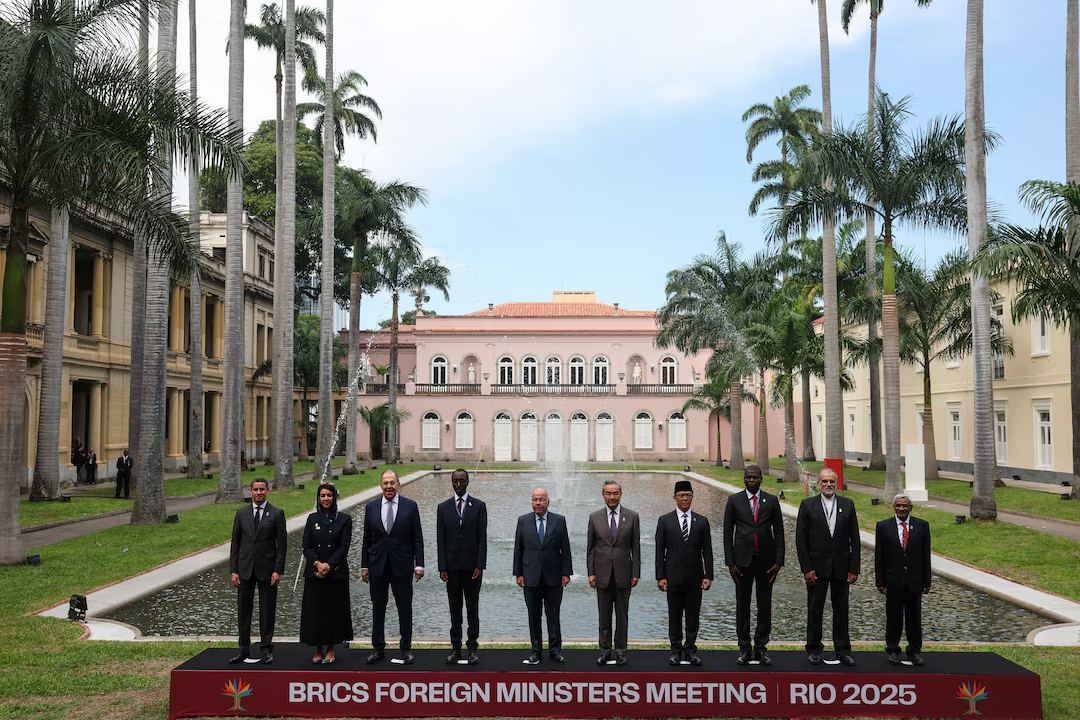
RIO DE JANEIRO, April 29 (Reuters) – Foreign ministers from the BRICS group of developing nations failed to agree on a joint communique on Tuesday, highlighting differences within the fast-growing diplomatic bloc, while the chair Brazil issued a statement condemning trade protectionism.
In the statement, Brazil said the group’s foreign ministers expressed “serious concern at the prospect of a fragmented global economy and the weakening of multilateralism” at their gathering in Rio de Janeiro.
The statement did not name the United States, which has taken a sharp protectionist shift under President Donald Trump, whose unilateral tariffs have raised concerns about a global economic slowdown.
The failure to reach a joint declaration was unexpected, a diplomatic source said, adding that there was room to iron out differences before July, when BRICS leaders will gather in Rio.
The expanded BRICS group, which includes Brazil, Russia, India, China and South Africa as well as new joiners Egypt, Saudi Arabia, the United Arab Emirates, Ethiopia, Indonesia and Iran, faces daunting challenges from U.S. trade actions.
“The ministers voiced serious concerns about the rise of unjustified unilateral protectionist measures inconsistent with WTO rules, including indiscriminate raising of reciprocal tariffs and non-tariff measures,” the statement said.
The statement reflected a broad consensus among the 11 countries, although a person involved in the negotiations said China – affected by 145% levies in the trade war with the U.S. – had pushed for a harsher tone.
“There was a consensus among all the countries, which is expressed in the declaration,” said Brazilian Foreign Relations Minister Mauro Vieira.
Still, the final declaration was a “chair statement,” falling short of a joint statement as the countries could not reach an agreement on all issues. Egypt and Ethiopia refused to accept some of the language calling for reform of the United Nations, including its Security Council, a longstanding aspiration of Brazil, India and South Africa.
That difference underscores the group’s new composition after new members that have competing views on some issues joined in 2024. The diplomatic source told Reuters that the new African members took issue with putting forward South Africa as a preferred BRICS candidate for a reformed Security Council.
“The expansion has its costs. Of course we have to work more to reach a consensus. But, at the same time, an expanded group has more power, more resources, more space for cooperation,” said the source.
Brazilian diplomats stressed the importance of a strong shared position on the central issue of “unjustified” trade barriers condemned in the declaration, which cited tariffs and non-tariff measures, such as the abuse of green policies for protectionist purposes.
“The main thing for BRICS is to ensure that the multilateral trade system doesn’t fall apart completely”, a diplomat told Reuters.
(Reporting by Lisandra Paraguassu; Additional reporting and writing by Andre Romani; Editing by Brad Haynes, Gabriel Araujo and Nia Williams)

